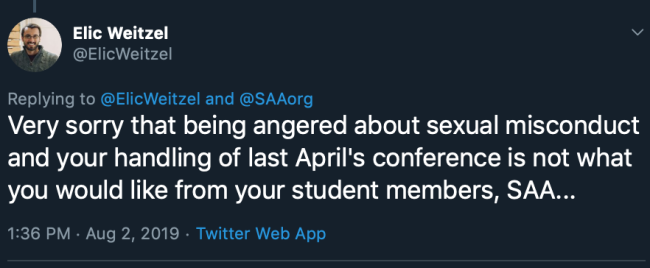You have /5 articles left.
Sign up for a free account or log in.

The Society for American Archaeology is still taking heat for how it handled a sexual harassment case at its meeting earlier this year -- and how it then blocked critics on social media.
Now the association is censoring member feedback, according to an internal email accidentally shared with a graduate student.
The society contacted first Elic Weitzel, a gradate student in anthropology at the University of Connecticut, late last month, asking him for a member testimonial “for possible inclusion on the new website, revamped membership brochure and social media channels.” The email said that Weitzel was an engaged member of the society and asked him to comment on what the organization means to him, what advice he’d give a student member and why he chose to join.
Those are loaded questions, given that many archaeologists continue to express disappointment over what happened at the society’s meeting in April and after: the organization allowed David Yesner, an archaeologist who’d recently been banned from the University of Alaska at Anchorage over multiple sexual misconduct reports against him, to attend the meeting -- over the protests of women present who said Yesner had harassed them. And when the science journalist Michael Balter told Yesner to leave, the society kicked Balter out of the meeting. (Yesner hasn’t commented publicly on the allegations against him.)
Following the meeting, several of the women involved said they were frustrated with the society’s response to their concerns. The organization drew more ire when it blocked a number of member critics on social media.
Citing the Albuquerque, N.M., meeting and its aftermath, Weitzel wrote in his testimonial that he wasn’t sure the organization has “much value anymore,” unless those responsible for “mismanaging the events surrounding David Yesner at the last meeting are removed from their positions.” As for what the society means to him, Weitzel wrote, “A once-great organization that is now suffering from mismanagement and denial surrounding the events of the last meeting.” He also said he’s reconsidering his membership.
Then, earlier this month, Weitzel got a letter of apology from the organization -- and an obviously misdirected internal communication about his response.
“I contacted Elic Weitzel to provide a member testimonial because we thought he was an involved and engaged student,” the misdirected email about his testimonial said. “It turns out that he is involved/engaged, however probably not in the way we would like.”
Weitzel shared the response on social media, saying, “Very sorry that being angered about sexual misconduct and your handling of last April's conference is not what you would like from your student members, SAA.” Little has apparently changed within the organization, he said. Weitzel shared similar concerns in a formal letter to the organization.
The society reached out to Weitzel. This week, he shared a number of suggestions for improvement with its representatives. More social media, not less, is best, he said, noting that he was poised to help as a representative on the organization’s Media Relations Committee. Weitzel also advised unblocking everyone on Twitter.
The society later shared an apology about the internal email on its Twitter account, saying what happened to Weitzel was wrong and that “it is precisely this type of honest feedback that we need in order to improve, no matter how hard it is to hear.”
Oona Schmid, executive director of the society, said via email Wednesday that Weitzel “was not blocked or censored by SAA” and that the comments “made by an SAA employee were referring to a request for a testimonial in a membership brochure.”
Schmid added, “We are in the process of reviewing our policies and procedures to enhance transparency and trust. This will take time, but we are committed to listening to feedback from all of our members.”
In the meantime, a number of archaeologists, including former Media Relations Committee chair Kristina Killgrove, remain blocked from the society’s account.
“I truly hope SAA is learning from this,” Killgrove said. “It's one of the things I'm trying to do -- make them learn and hold them accountable to membership. Organizations as large as SAA -- and run by paid staff -- tend to see their top priority the preservation of the organization. And that kind of sucks.”
Still, Killgrove and others -- including Anchorage anthropology student Norma Johnson, who has identified herself as one of Yesner’s targets -- say that Weitzel has already gotten a clearer apology than the women affected by Yesner’s presence at the conference did.









